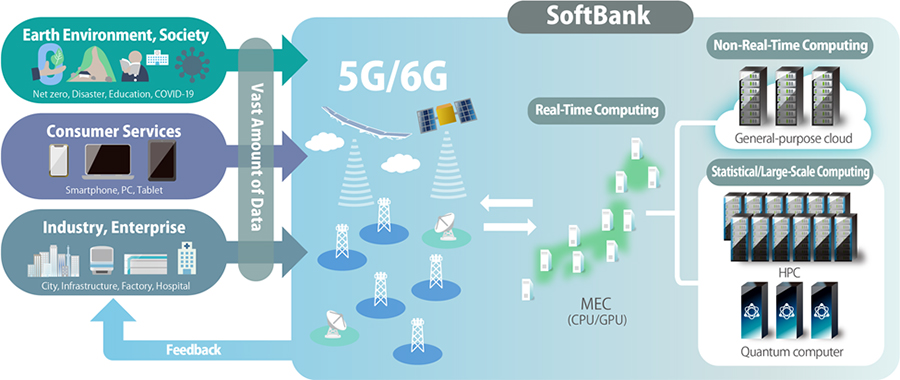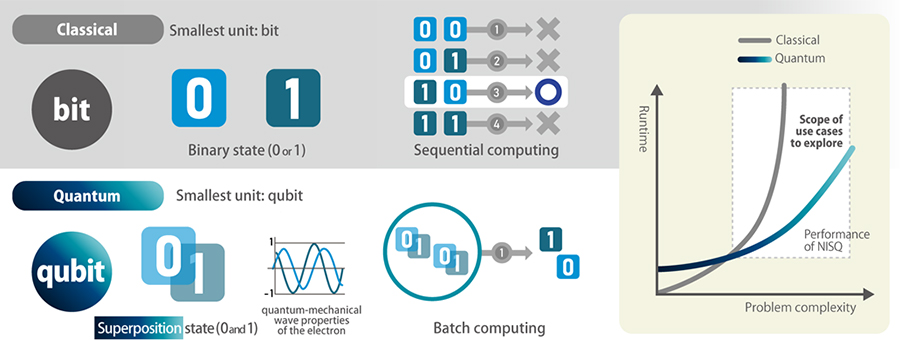Press Releases 2023
SoftBank Corp. Launches Joint Research
with Keio University
with View to Business Utilization of Quantum Computers
Researchers exploring use cases
by simulating quantum mechanical effects of atomic nuclei on quantum computers
July 19, 2023
SoftBank Corp.
SoftBank Corp. (“SoftBank”) launched a joint research collaboration with Keio University with a view to the business utilization of quantum computers. Initially research will be conducted in the field of quantum chemistry, which involves the quantum mechanical analysis of molecules and nuclei.
SoftBank will dispatch researchers to the Keio University Quantum Computing Center to simulate nuclear quantum effects (NQEs) which cannot be efficiently computed by classical computers. These simulations will be performed using Noisy Intermediate-Scale Quantum (NISQ) computers, and will be used to investigate the mechanisms of chemical phenomena and validate NISQ use cases for social implementation. SoftBank will continue to conduct research in multiple fields including quantum machine learning and optimization planning, and work with mobile technologies such as 5G and 6G communication systems and IoT to contribute to the social implementation of quantum computers.

Principles and challenges of quantum computers
With the rapidly increasing need for data analysis, exemplified by the use of AI, enormous amounts of processing power for computation is becoming more necessary. However, classical computers are struggling to process these computation amounts within a practical timeframe. This has led to a new approach utilizing quantum computers to solve complex calculations. The pursuit of quantum computing has gained significant momentum as it offers diverse applications across various industries, including public transportation, logistics, finance, manufacturing, and the development of new drugs and materials.
Classical computers, which are widely used today, use “bits” as the basic unit to represent either a state of 0 or 1. In contrast, quantum computers use “qubits” as their basic unit, which take advantage of the quantum mechanical property known as superposition, enabling them to be both 0 and 1 at the same time. Therefore, quantum computers have the potential to compute high-dimensional, quantum mechanics-based calculations that are exponentially faster compared to classical computers, which require long computation times in realistic scenarios.

On the other hand, current quantum computers, also known as NISQ, are susceptible to noise, making the computations less precise, which thus require further technological advancements to improve accuracy. These include developing quantum computers that can extend the time that the quantum state can be maintained, accurately controlling the states of qubits, reading their states accurately, and developing error correction techniques.
Overview of Joint Research Collaboration
The joint research collaboration between SoftBank and Keio University in the field of quantum chemistry will focus primarily on two themes as follows:
- Molecular simulation treating NQEs
Quantum chemistry is a field that seeks to understand the internal structure and mechanisms of reactions in molecules and nuclei based on the laws of quantum mechanics. However, many molecular level simulations using classical computers in fields such as chemistry, biology and material science treat atomic nuclei as classical particles that are independent of electrons, because it is difficult to calculate the nuclear quantum effects (NQEs) and the interaction between electrons and atomic nuclei in a realistic amount of time with limited computational power. When dealing with small and light nuclei, however, ignoring the NQEs can result in significant errors.
Quantum computers are well-suited to efficiently simulate the quantum mechanical behavior of atomic nuclei and to directly simulate the interactions between electrons and nuclei. Therefore, in this joint research collaboration, SoftBank and Keio University believe that if they can demonstrate the ability of the NISQ computer to effectively simulate the NQEs, high-precision simulations can be achieved. This could lead to innovative developments in various fields, including the discovery of new drugs and materials.
- Verification of NISQ use cases through simulation using the Path Integral Molecular Dynamics (PIMD) method
One of the simulation methods that treats the NQEs is the Path Integral Molecular Dynamics (PIMD) method. PIMD evaluates all possible paths of particles simultaneously and assigns specific amplitudes to each path. The sum of these amplitudes (integration) is used to express the NQEs. However, a major issue with this method is the extremely high computational cost. In this joint research collaboration, SoftBank and Keio University will verify whether the NISQ computer, known as a quantum computer, can simulate all paths using the PIMD method and efficiently express the quantum mechanical behavior of atomic nuclei inside molecules and nuclei.

- SoftBank, the SoftBank name and logo are registered trademarks or trademarks of SoftBank Group Corp. in Japan and other countries.
- Other company, product and service names in this press release are registered trademarks or trademarks of the respective companies.